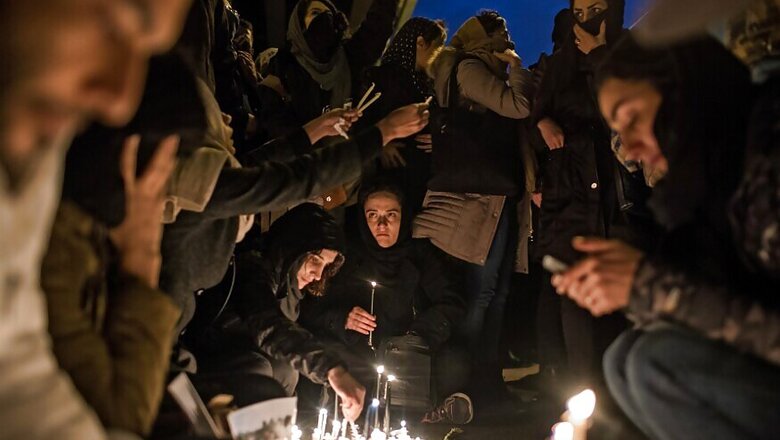
views
Moscow: Moments after an Iranian Revolutionary Guard unit mistakenly launched a missile at a Ukrainian passenger jet, the pilot of a nearby airliner radioed air traffic controllers to report an alarming streak of light in the sky and then a mid-air explosion.
“Flares on route, as if from a missile,” the pilot reported to the control tower in Tehran as he brought his plane in for a landing, a leaked audiotape of the exchange shows. “Should anything like this be happening there?”
“We were not informed of this,” the controller said. “What does this light look like?”
The reply: “That surely is the light from a missile.”
When the controller then tried to raise the crew of Ukraine International Airlines Flight 752, there was no response.
The Iranian pilot reports seeing an explosion, then sought reassurance: “Is our course OK?”
“Yes,” the controller said. “I don’t think there will be any problem for you.”
“God forbid!” the pilot responded.
After a transcript of the recording was leaked to a Ukrainian news site Sunday, Iran halted its cooperation — already described as reluctant — with Ukraine’s inquiry into the downing of the plane. The Iranians said they expected such evidence would have been kept confidential.
The missile killed all 176 people on the Ukrainian plane at a time of already high tensions as the United States and Iran traded attacks in the region, raising fears of further violence.
Ukraine’s president, Volodymyr Zelenskiy, verified the audio recording’s authenticity and said it had been obtained by Ukrainian crash investigators. The Iranians did not dispute its authenticity.
Its leak to the news site seemed to reflect frustration among Ukrainian government officials over what they said was Iran’s lack of cooperation in the inquiry, particularly its refusal to hand over the downed plane’s black boxes.
While the Iranian government has admitted that the Guard fired on the plane, it did so only after three days of stonewalling. And even then, President Hassan Rouhani insisted that the truth had been concealed from him and other members of the elected government by the air defense unit of the Guard.
In an interview with Ukrainian media, Zelenskiy claimed that the exchange captured on the tape made clear that Iranian authorities knew almost immediately that a missile had brought down the plane, though the air traffic controller is the only government worker heard on the audio tape. He did not provide any evidence that the controller quickly shared that information with government officials.
Zelenskiy did not directly contradict the Iranian government’s claim that it had been kept in the dark, but he noted that even the military — which knew what had happened — continued to issue false statements. Those included a claim that the crash had been caused by mechanical problems. That, he said, showed a broad effort to suppress the truth in those first three days.
“We understood that the Iranians — we were not sure exactly who — but they wanted to defend themselves in such an unlawful way, by pushing information that it was a technical flaw,” Zelenskiy said.
The recording begins a few minutes after Ukrainian Flight 752 took off from Imam Khomeini Airport in Tehran on January 8.
At the time, Iran’s air defenses were on high alert amid tensions with the United States. An American drone had recently killed a top Iranian security commander, Gen. Qassem Soleimani, and Iran had retaliated by firing missiles at U.S. forces on bases in Iraq.
Iranian military officials said that an air defense crew — fearing an American counterattack — had fired on the civilian airliner in error, and that it took time to investigate the circumstances. The government said the generals had for days dragged their feet in sharing this information with elected officials.
Iranian officials have said the leadership of the Revolutionary Guard, which is subordinate only to Iran’s theocratic leader, as well as the regular military knew the crew of a mobile anti-aircraft system had fired missiles, but effectively sidelined the elected government by creating a secret investigative committee.
That committee examined data from the airport, radar networks and witnesses including the missile crew, Iranian officials said. It was not clear if this committee blocked access to the air traffic control recordings.
Zelenskiy, in the interview, said Iran’s air traffic controllers did not, in any case, provide the recording to Ukrainian investigators who traveled to Iran. He said Ukraine had obtained it independently, a claim disputed by the director of Iran’s Civil Aviation Organization.
The aviation director, Hassan Rezaifar, told Mehr, a semiofficial news agency, that Iran had provided it to the Ukrainians.
The victims of the plane’s downing included 82 Iranians, 57 Canadians and 11 Ukrainians. Zelenskiy said the Iranian government had offered $80,000 to the families of each Ukrainian victim, but that he had rejected the offer as insufficient.
Andrew E. Kramer c.2020 The New York Times Company



















Comments
0 comment